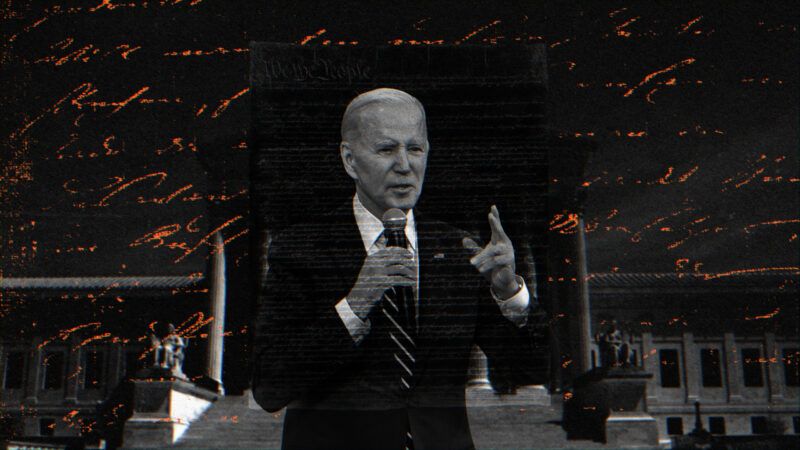Today at the Supreme Court: Biden's Student Loan Cancellation Plan on Trial
The Supreme Court considers the scope of presidential power in Biden v. Nebraska and Department of Education v. Brown.

The U.S. Supreme Court will hear oral arguments today in a pair of cases that ask fundamental questions about the scope of executive power while simultaneously testing the legality of one of President Joe Biden's signature political acts.
The cases are Biden v. Nebraska and Department of Education v. Brown. Both center on Biden's 2022 use of executive authority to cancel up to $10,000 in student loan debt for every borrower who earns less than $125,000 a year while canceling up to $20,000 for every borrower who took out a Pell Grant and earns less than $125,000 a year.
The Biden administration argues that it has the power to take such action under the terms of the Higher Education Relief Opportunities for Students (HEROES) Act of 2003, which allows the secretary of education to "waive or modify any statutory or regulatory provision applicable to the student financial assistance programs under title IV of the [Higher Education] Act as the Secretary [of Education] deems necessary in connection with a war or other military operation or national emergency." According to the Biden administration's brief to the justices, "the plan falls squarely within the plain text of the HEROES Act; indeed, a central purpose of the statute is to authorize the Secretary to grant student-loan-related relief to at-risk borrowers because of a national emergency—precisely what the Secretary did here."
To prevail, the parties challenging Biden's executive action need to clear two distinct legal hurdles. First, they must prove that they have "standing" to sue in the first place. And that is not always such an easy thing to prove. The Supreme Court has repeatedly said that aggrieved taxpayers alone do not, as a general rule, have standing to sue the government over allegedly illegal laws. The Court reaffirmed this in Hein v. Freedom From Religion Foundation (2007), in which a group opposed to government funding of religious activity sued the George W. Bush administration over its creation, via executive order, of the Faith-Based and Community Initiatives program. "Generally, a federal taxpayer's interest in seeing that Treasury funds are spent in accordance with the Constitution is too attenuated to give rise to the kind of redressable 'personal injury' required for Article III standing," wrote Justice Samuel Alito.
The parties challenging Biden's plan in Biden v. Nebraska are six states (Nebraska, Missouri, Arkansas, Iowa, Kansas, and South Carolina) who argue that because they participate in various ways in the federal student loan industry, they stand to suffer financial harm if the plan goes into effect. And that harm, they argue, qualifies as a cognizable injury sufficient to trigger Article III standing. The parties in Department of Education v. Brown, meanwhile, are student loan borrowers who are not covered by the terms of Biden's actions.
Assuming either the states or the private parties (or both) clear the standing hurdle, the case then becomes all about executive power. Contrary to the Biden administration's position that the HEROES Act speaks clearly in this matter, the states maintain that the administration's "unprecedented reading of the HEROES Act claims breathtaking and transformative power beyond [the secretary of education's] institutional role and expertise." The law "permits the Secretary to keep borrowers from a 'worse position' by maintaining the status quo," the states told the Court. "It does not allow the Secretary to put nearly every borrower in a better position by reducing or eliminating their principal balances."
One of the difficulties for the legal challengers is that the HEROES Act is a broadly worded statute. Enacted as a post-9/11 measure, its original purpose was to allow the executive branch to ameliorate the student loan situations of service members fighting the war on terror. Yet the law's text is not limited to wartime; it also authorizes executive action during a "national emergency," such as the COVID-19 national emergency first declared by President Donald Trump. Will that broad language be enough for Biden to win?
Not necessarily. In West Virginia v. Environmental Protection Agency (EPA) (2022), the Supreme Court said that the judiciary must "hesitate" before assuming that Congress granted certain powers to the executive branch when the executive "'claim[ed] to discover in a long-extant statute an unheralded power' representing a 'transformative expansion in [its] regulatory authority.'" In other words, when the president says that Congress authorized some big-time regulation that the executive branch wants to carry out, West Virginia v. EPA says that the president must produce "clear congressional authorization" or else lose in court.
Perhaps the simplest way of thinking about today's legal showdown is this: How much deference or leeway is a majority of the current Court willing to extend to this president? Answer that correctly and you may know the outcome in advance.


Show Comments (31)